Mekong News - Archive
October-December 2006
Issue 2006/4
In this issue:
- Strategic Plan ready to go into operation
- MRC aids transboundary water quality study
- Modern methods will improve irrigation
- Drought Management Programme under formulation
- Taking the Mekong to the media
- Gender talks share real life experiences
- MRCS boat race team rows with Mekong Spirit
- Community involvement makes IWRM work
- Annual Flood Report a first for region
- Forum researches into water for food
- Upcoming events
Strategic Plan ready to go into operation
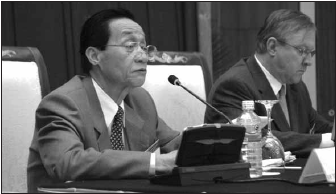
Joint Committee Chairman H.E. Mr Sin
Niny addresses the
meeting.
The MRC Joint Committee (JC) endorsed the final draft of the Mekong River Commission's Strategic Plan 2006-2010 at its 24th meeting in Vientiane on 29-30 August.
This plan sets the path for the MRC's work for the next five years.
In order to guarantee strong country ownership, the Strategic Plan went through an extensive consultation process with the Member States and stakeholders in the basin and is now an honest reflection of their views. Because MRC wants this plan to be as inclusive as possible it also took on board the opinions of donors and members of civil society.
The MRC now has a very good consensus to support its work over the next five years.
The Strategic Plan has an overall goal aimed at supporting our member countries to make "More effective use of the Mekong's water and related resources to alleviate poverty while protecting the environment."
The JC meeting also endorsed the 2007 Work Programme and discussed the future of the Basin Development Plan which will now continue in a transition phase until the promised funding for BDP2 comes through next year.
The meeting approved the MRC 2006 Work Programme, but postponed agreement on the 2007 programme and approval of the Operating Expenses Budget for 2007 until discussion on the future of the Water Utilisation Programme was complete.
The meeting heard about the progress of the MRC's most recently implemented programmes: the Navigation Programme and the Flood Management and Mitigation Programme, which have gradually started up full implementation in 2006, as well as progress reports on all other MRC programmes.
The JC Meeting was followed by the 11th Dialogue Meeting with Dialogue Partners, China and Myanmar on September 1.
Delegates heard that China had continued its provision of daily hydrological data to the MRC during the current flood season and that in January 2006 the MRC Secretariat had commenced supplying China with monthly flow data from hydrological stations in Chiang Saen, Thailand and Stung Treng, Cambodia.
In June 2006 the MRC had organised a technical mission to consolidate the capacity of Chinese technical staff in using automatic equipment provided by MRC. China further informed MRC of its plans for improving navigation on the Mekong and there was discussion on more concrete steps being taken toward increasing technical cooperation.
Following the meeting the delegates had the opportunity to visit one of the local fisheries at Nam Houm, about 30km from Vientiane, where a successful community management scheme established by the MRC Fisheries Programme has been in operation for some years.
The visit also took in a trip to the Agricultural Development and Service Centre, a centre established by the Lao Government with assistance from the King of Thailand. The centre helps local people learn better ways how to cultivate crops and raise animals and fish.
MRC aids transboundary water quality study
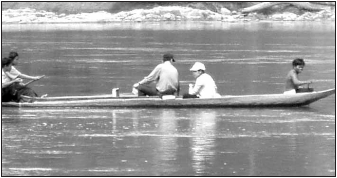
Team members sampling the water at
Pumpi sampling site
in Cambodia.
One of the strengths of the Mekong River Commission is that it enables members to work together to mitigate any potentially difficult transboundary issues in the region. This kind of transboundary management work is exemplified by the MRC's Environment Programme which last year responded to a request from the Cambodian Government to engage in a one-year water quality monitoring study to test the water in the Se San River below a hydropower dam.
There had been reports, though local NGOs, of some downstream effects on the water quality in the area following the dam construction and operations and this issue was conveyed to MRC by the Cambodia National Mekong Committee (CNMC). The CNMC requested that MRC investigate water quality in the Se San River.
As Viet Nam and Cambodia have already set up an advisory body in order to solve any differences regarding the Se San River basin management, the two countriesagreed that the role of the MRC Secretariat was to assess the information raised by the NGO. It was decided to initiate a programme of investigation that focused on longterm ambient conditions for conventional parameters that are linked to environmental conditions.
With only anecdotal evidence of the effects of water quality on public health, it was not possible to develop a programme of investigation that targeted specific water quality or public health attributes.
There was relatively little other water quality information available and epidemiological information was not available to MRCS.
The field study was developed by the MRC's Environment Programme and sent to the VNMC and the CNMC for comment in December, 2003. The study design was approved by both governments and a joint field team selected sampling stations. The field programme was initiated in May of 2004 for a one year period.
Potential impacts on water quality may be from nutrients, organic matter and bacteria, therefore parameters were selected to monitor these impacts directly. Most of these were measured in the field to avoid analytical errors caused by sample transportation over long distances from field sites to laboratories and inadequate preservation of samples.
The parameters chosen were: Temperature; pH; conductivity; turbidity (suspended sediment); dissolved oxygen (DO); chlorophyll; and total coliform bacteria.
The sampling programme was conducted using four stations, three in Cambodia and one in Viet Nam, with sites selected by the two countries. Sampling took place every two months in the rainy season from May 2004 to November 2004 and every month in the dry season from December 2005 to May 2005, by national teams with assistance from MRC Secretariat staff.
The overall results showed that the ambient water quality of the Se San River was good at the time of sampling in terms of the measured parameters. The river displayed pH and turbidity levels similar to other rivers in the region with characteristic increases in the rainy season and decreases in the dry season.
The dissolved oxygen concentration of the Se San River was high (meaning a healthy environment for animal life) and low chemical oxygen demand values indicate that there is little organic pollution in the river.
The measured levels of chlorophyll in the Se San reflect good water quality. There was no significant difference in conductivity, pH, DO and total chlorophyll of Se San River at the two transboundary sites – Pleicu (SS1) in Viet Nam and Pum Pi (SS2) in Cambodia.
This study focused on water quality and did not take other physical changes in the river into account in terms of its environmental condition. The investigation will continue.
The results of the studies were reported to Cambodian and Vietnamese authorities and local NGOs at a meeting held in Rattanakiri, Cambodia. The NGOs present put forward constructive criticism focusing on the lack of assessing short term changes, filamentous algae and human health issues. The meeting concluded with an agreement to work together to address these concerns.
The study was financed from donor support provided to the MRC's Environment Programme.
Modern methods will improve irrigation
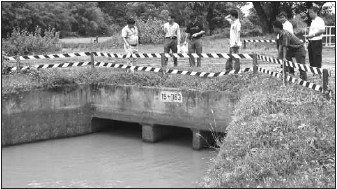
The Thai team inspects the Huay Luang
irrigation project
site in Udon Thani.
The Improvement of Irrigation Efficiency in Paddy Fields in the Lower Mekong Basin project (IIEPF) is introducing up-to-date concepts in assessing irrigation efficiencies in order to produce guidelines to help project managers control water resources more efficiently, sustainably and productively.
The project not only focuses on efficiency, but covers all aspects of scheme improvement with three major objectives: (1) to appraise irrigation efficiencies (2) to enhance the capacity of stakeholders and (3) to produce guidelines for improving irrigation efficiency on paddy fields based on actual water use conditions in the LMB member countries.
The project document has been finalised, and field observation and data collection will start from October 2006 in four irrigation schemes in LMB countries which have been selected as pilot sites. The sites are the Huay Luang irrigation project in Udon Thani, Thailand, the Nam Houm irrigation project in Lao PDR, the Komping Pouy irrigation project in Cambodia, and the Go Cong irrigation project in the Mekong Delta, Viet Nam. Most schemes are gravity irrigation systems, except the GoCong project which uses tidal irrigation.
Under the project conveyance and overall system, irrigation efficiencies will be analysed, water productivity will be computed, and then recommendations will be made to improve the efficiency of water use.
The Food and Agriculture Organisation's (FAO) Rapid Appraisal Process (RAP) will be applied as a tool to evaluate scheme performance as a part of the project's analysis. Training in RAP techniques by senior water management officers from FAO has already been conducted for each country team as part of the project cooperation between MRC and FAO.
The RAP was jointly developed by the Irrigation Training and Research Centre of California Polytechnic University and FAO in the late 1990s and since then has been successfully used by FAO and the World Bank in various Asian countries to appraise several irrigation projects.
Key performance indicators from RAP help facilitate informed decisions regarding the potential for water conservation within a project, specific weakness in project operation, management, resources, and hardware, and specific modernisation actions that can be taken to improve project performance The RAP also provides initial indicators that can be used as benchmarks to compare the improvements in the performance of the system once the modernisation plans are implemented.
The IIEPF project is supported by the Ministry of Agriculture, Forestry and Fishery, Japan and implemented by the MRC’s Agriculture, Irrigation and Forestry Programme.
Drought Management Programme under formulation
Following requests from the MRC Joint Committee and the MRC Council, the MRC Secretariat is currently formulating the first stages of a new Drought Management Programme.
The drought years of 2003-2004 hit several areas of the basin very hard, particularly northeast Thailand and parts of Cambodia, and the Member States realising the need for such a programme acted swiftly to put this need into action.
Now the initial programme strategy and programme document is nearing completion and will be ready for approval very soon, after which donors will be sought to fund implementation.
The process of formulating this programme has been driven by the Member States who have been involved throughout in developing its objectives, components and activities to meet the basin’s requirements.
The Drought Management Programme formulation has been supported by the Water Utilisation Programme, as it is directly linked to implementing the Procedures for the Maintenance of Flows on the Mainstream – especially the dry season requirements.
The programme’s main objective is to support cooperation in drought management within the Lower Mekong Basin and thus reduce the vulnerability of the people to drought and economic losses.
Taking the Mekong to the media
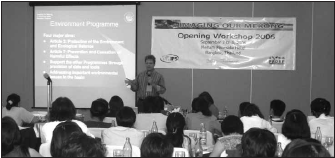
The EP’s Hans Guttman addresses journalists
at the
| Imaging Our Mekong workshop.
Spreading the word about the work of the MRC is an important part of our communications strategy and two recent training courses for young journalists from the six Mekong countries offered a valuable opportunity to meet the media. Both courses concentrated on Mekong themes and attracted participants from print and electronic media.
At the opening workshop of the Indochina Media Memorial Foundation's (IMMF) print journalism training course held in Bangkok the MRC representative discussed some of the challenges facing the Mekong regions and what MRC was doing to help its members meet these challenges.
“River Road from China – Managing the Mighty Mekong” was the theme of the IMMF's print journalism training course and during their four week course the journalists, who had a primary interest in environmental matters, undertook a 10-day field trip in Chiang Khong and Chiang Saen in Thailand.
The 40 journalists attending the Interpress Asia-Pacific “Imaging Our Mekong” media fellowship programme had a different agenda – they were about to undertake in-depth coverage of transboundary issues at a time of regional integration and development.
At the opening workshop to orient the journalists on different cross- border issues to help them in their assignments, the MRC's Environment Programme Manager explained about how the MRC helps its member countries deal with potential transboundary issues, working in areas such as water quality testing, hydropower and wetlands. He also discussed the way the MRC was facilitating the building of trust between NGOs and government bodies so they could work together.
The journalists will produce articles, photo essays and documentaries, which will be published in their local media at home. The best stories will be compiled into DVDs and books produced by IPS.
Gender talks share real life experiences
As part of the MRC's Gender Mainstreaming Project, a series of talks and Q&A sessions has been going on at the MRC Secretariat, whereby invited speakers share their knowledge of gender work in the Mekong Basin.
The staff at MRCS have already heard from the MRC Fisheries Programme's Dr Wolf Hartmann on the important role women play in the fisheries sector, and the programme's own work in the Regional Network for Promotion of Gender in Fisheries. In October the staff were lucky enough to hear Dr Barbara Earth, a professor from the Gender and Development Studies Programme, Asian Institute of Technology, Thailand, entitled Technocracy Meets Ethnicity: a World Bank Water Supply and Sanitation Project in the Mekong Delta.
Dr Earth’s team assessed a water supply project in Soc Trang Province, Viet Nam which consisted of three components. These met with varying levels of success, with the system which had the most community input being the best received, while two other systems were less successful.
Dr Earth’s talk highlighted the need to include community views and knowledge when implementing development projects and also the importance of gender sensitivity and ethnic sensitivity. It was followed by a lively discussion.
MRCS boat race team rows with Mekong Spirit
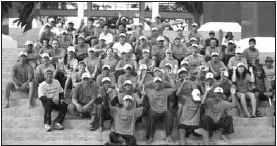
The MRC Secretariat fielded a mixed male and female team for the Vientiane Boat Race Festival in October 2006. The team was a combined effort with representation from the Secretariat, the Lao National Mekong Committee, MRC partner the Worldwide Fund for Nature (WWF) and assorted friends. The crew paddled in a traditional boat along with the men from a nearby village and competed in five heats, but unfortunately did not win any.
H.E. Mr Khamlouat Sidlakone, Minister to the Prime Minister’s Office and Council Member for Lao PDR (in white T-shirt and cap in centre) joined the team after the races and congratulated everyone on their efforts and for celebrating the Mekong Spirit.
Community involvement makes IWRM work
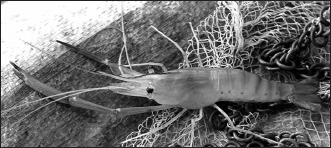
With better water management, farmers
can improve their
shrimp harvests.
The MRC's Fisheries Programme has helped local communities in Soc Trang province, Viet Nam, put Integrated Water Resources Management (IWRM) into practice successfully through a programme of community involvement.
Communication and agreements between farmers and government units combined with capacitybuilding in better sharing and use of water for multiple purposes have made localised, bottom-up and livelihoods-oriented IRWM in the Mekong Delta province a reality.
Soc Trang province is a traditional rice-growing area. Over the past decade, farmers in areas subject to saline intrusion discovered the benefits of dry season shrimp culture. Shrimp is a lucrative crop, so farmers have increasingly converted from rotational rice-shrimp culture to more intensive shrimp pond systems.
But there are risks. If crops fail the community suffers severe economic losses and heavy debt loads. Without a rotational system, pollution from shrimp culture accumulates, rather than being absorbed as fertiliser.
Coordination of water use also poses challenges. If brackish water enters an area too soon, the remaining rice crop suffers. Draining a pond in case of disease outbreak can lead to outbreaks in neighbouring fields. Pumping of mud from ponds pollutes the water supply for other farmers.
At the suggestion of the Research Institute for Aquaculture No. 2, in Ho Chi Minh City, and through a team based there, MRC Fisheries Programme's Fisheries Management and Governance Component (FMG) started work in Soc Trang in December, 2003. Capacity strengthening of fisher and farmer groups and local government units is a special concern of the FMG and in order to develop a locally acceptable approach, it first focused on Hoa Tu 1 Commune, My Xuyen District.
Training events addressing problems in shrimp culture and water management and capacity-building included holding regular meetings and monitoring of outcomes, fisheries regulations, livelihoods development, organisational skills, and financial management.
By the end of 2005 farmers noted that local officials were more responsive, pollution problems were reduced and shrimp yields were up. Farmers also developed a better understanding of the rules of their organisations, and attendance at meetings rose.
Since early 2006, activities have been expanded to communes along the “basin” of Thanh My canal. Emphasis is now on strengthening the capacity of farmer organisations and local officials to work together to manage water resources. A task group with representatives from all participating farmer groups and government organisations has been established. Results look good.
As vice-chairman of the People's Committee of My Xuyen district Mr Luong Minh Quyet confirms: “In 2006, almost all farmers harvested shrimp successfully, very few pumped mud into the canal, and in 70% of ponds rice is being cultivated in the rainy season instead of a second shrimp crop. This is due to good participation of local government units and farmers in water management.”
Annual Flood Report a first for regiont
In August the MRC published its First Annual Flood Report covering the impact of the 2005 flood season on the Lower Mekong Basin and the four Member States.
This report contains data and first hand reports of the 2005 flood season as it affected inhabitants of the Lower Mekong Basin countries. This MRC Annual Flood Report 2005, the first flood report to be published at LMB level, was prepared as part of the MRC's Flood Management and Mitigation Programme (FMMP) at the Regional Flood Management and Mitigation Centre (RFMMC).
The report is intended to be an account of the floods which occurred during 2005. It will serve as a source of information and as a reference document for the MRC Joint Committee and Council members and also for a wider audience, such as the agencies responsible for disaster management and mitigation in the MRC Members States, institutes involved in water resources planning, donor organisations and NGOs.
"The MRC has instigated this initiative because we realise how important it is to listen to the comments of the people of the basin. Their needs are our top priority," MRC Secretariat Chief Executive Officer Dr Olivier Cogels said.
“Our programmes are driven by these needs and we recognise that the comments and information gathered from those communities most affected by floods is essential if we are to provide solutions to the challenges facing the poorest people in our region.”
The MRC's FMMP will update the report annually and will use data gathered to improve its flood management and mitigation activities.
This report will prove to be an invaluable tool in helping the MRC provide more accurate data for flood preparedness and also help member countries in planning future land use.
The Annual Flood Report is one of the major outputs of the MRC's FMMP which was designed to support the MRC member countries to create adequate responses to flood events. The development objective of the FMMP is: "to prevent, minimise or mitigate people's suffering and economic losses due to floods, while preserving the environmental benefits of floods".
This objective is the key to a balanced approach and reinforces the region's commitment to “living with floods”. The Annual Flood Report 2005 was produced under the financial support from the Royal Netherlands Embassy in Hanoi, Vietnam, for component 1 of the FMMP of MRCS.
Forum researches into water for food
The Challenge Programme on Water and Food held an International Forum on Water and Food, in Vientiane, Lao PDR from November 12-17, 2006, hosted by the MRC.
This event was designed as a medium for discussion and debate, rather than presentations. It highlighted research achievements in the field of water productivity in agriculture, and recommended areas for research, as well as showing how waterproductivity research results can be better translated into positive developments and recommending future areas for research and development investment.
The conference had five themes: Crop water productivity improvement; water and people in catchments; aquatic ecosystems and fisheries; integrated basin water management systems and global and national water and food systems.
Upcoming events
International Symposium - Water Resources
and Renewable Energy Development in Asia
30 November - 1 December 2006, Bangkok, Thailand
Email: BKK2006@hydropower-dams.com
Tel: +44 (0)20 8643 5133
13th Meeting of the MRC Council
12 December 2006 ,Ho Chi Minh City, Viet Nam
Email: schiefer@mrcmekong.org
11th Meeting of the Donor Consultative
Group
14 December 2006, Ho Chi Minh City, Viet Nam
Email: schiefer@mrcmekong.org
MRC Environment Programme Annual Technical
Meeting
January 2007, Chiang Mai, Thailand
Email: guttman@mrcmekong.org
The International Conference on Water
and Flood Management
12-14 March 2007 Dhaka, Bangladesh
www.buet.ac.bd/icwfm/
Choose a newsletter:
